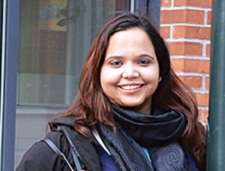“Being a woman in Nepal must be hard?” many of my friends in Norway often ask me. It certainly is. Being a woman, I have faced a lot of sexist remarks and harassment on a daily basis. I am thrown up with different expectations of patriarchal roles. I am 30, single, career-oriented, and that somehow makes me an “evil person”.
Ever since I was a little girl, I have been told not to be “friends” with a boy, not to “hang out” after school. When my mum asked me to give up dancing, I gave up. When my aunt thought it was not a right thing to play football with boys at school, I gave up. During my teenage, the media brainwashed me by asking me to grow taller, slimmer, and fairer because that’s how “beautiful women” are. Dress in such a way that it is not too traditional yet not too vulgar. Smile in such a way that makes you likeable but not too “easy.” As I got older, I find out it was not the same for my brother or someone who was born as a man.
Why are women expected to be under these social norms? Why are we expected to undertake certain gender stereotypical roles of cooking and cleaning? Is it hard for women only?
No, it is not. I know there are different struggles in the men’s world as well. Having to oppress your emotions is not easy. That burden to earn more than what your wife keeps you under the constant pressure. The horrible job that you cannot quit because you are the breadwinner of the family is killing you inside. I know how many times you wished that you could share that special bond with your little baby just like the way your wife does.
The point is there are downsides to each gender. However, the main difference is women are discriminated right from their birth and sometimes even before the birth. The only problem with women of my generation is we are aware that we are discriminated. I know it is wrong when my neighbor’s son went abroad at 18 for a better future and his daughter who was of 20 was married against her will. I know it is not okay when my society thinks my mother is “lucky” as my dad “helps” my mother in the kitchen.
It is more painful when you know your rights but you cannot claim for one.
I know this preference for a baby boy can end easily as soon as we agree to share a surname of the mother. (I know this point seems funny in a country where women still are fighting for equal citizenship rights). Nobody would go for selective abortions as long as society approves that it is normal to live with your son-in-law just like the away it is now with the daughter-in-law. Would you hesitate to give the equal share of your property if your daughter takes care of you as your son?
The problems aside, when I look back to my journey I still feel proud to be a woman. Yes, we face a lot of problems just because of our gender, but at the end of the day, these complications have made me a better person today.
I never had to struggle to prepare a pancake for the breakfast and to make a nice set of dal-bhat. I can digest the meanest comment with a smile. I do not get mad over petty issues. I cannot think of being violent in my darkest dream. I have the confidence to balance my work and family even after having kids. I would not be disappointed if there is no cooked meal and clean sheets when I go home after work.
I am proud to be a woman because I can cry while watching TV soaps or reading a novel. I am proud of being a woman when I feel empathy for an unwell person. I am happy with how much I have experienced at home, school and work. I am getting older and I no longer compare myself with the beauty standards created by male-dominated media. I know well that I can never look like the cover girl in the magazine because the girl in the magazine does not even look like the girl in the magazine. I have developed the confidence to win the world.
Importantly, I am proud because I am not sure if I would have the same emotions and skills if I were brought up as a man in a Nepali society.
By Samiksha Bhattarai
The writer is a PhD Student at the department of media and communication at the University of Oslo, Norway. She can be reached at sameexa@gmail.com







